Dr Pradyut and Students Revolutionise Disease Detection

In the groundbreaking research paper titled “Innovative Web Application Revolutionizing Disease Detection: Empowering Users and Ensuring Accurate Diagnoses,” Dr Pradyut Sanki, Associate Professor at the Department of Electronics and Communication Engineering, along with doctoral scholars Mr P N S B S V Prasad, and Mr Syed Ali Hussain and BTech students Ms Pragya Gupta and Ms Swikriti Khadke introduce a cutting-edge web application that aims to revolutionise disease detection and empower users to understand their health conditions.Their research paper published in the Journal of Electronic Materials has an impact factor of 2.1.
Abstract:
This paper presents an innovative enhancement aimed at revolutionizing disease detection and providing users with a reliable source of information for accurate diagnoses of their symptoms. Our open-source initiative combines a user-friendly interface design with advanced machine learning models, establishing a new benchmark for accuracy and enabling integration with even higher-performing models. We address the pervasive challenges of misinformation and misdiagnosis associated with online symptom searches, presenting a significant advancement in disease detection. Leveraging cutting-edge machine learning techniques.
Practical and Social Implications:
The practical implementation of our research means that people can use our smart tool to get better advice about their symptoms. This could lead to quicker and more accurate diagnoses, helping people get the right treatment sooner. Socially, our research could reduce the spread of false information online about health issues, leading to better-informed decisions and potentially improving overall public health.
Future Research Plans:
As a future research plan the students and faculty together plan to refine and expand their smart tool to make it even more accurate and helpful. They aim to incorporate feedback from users and collaborate with other experts to continually improve the technology. Additionally, they plan to explore ways to make the tool more accessible to a wider range of people and to address any potential biases in the data or algorithms. Overall, they are committed to advancing healthcare technology for the benefit of society.
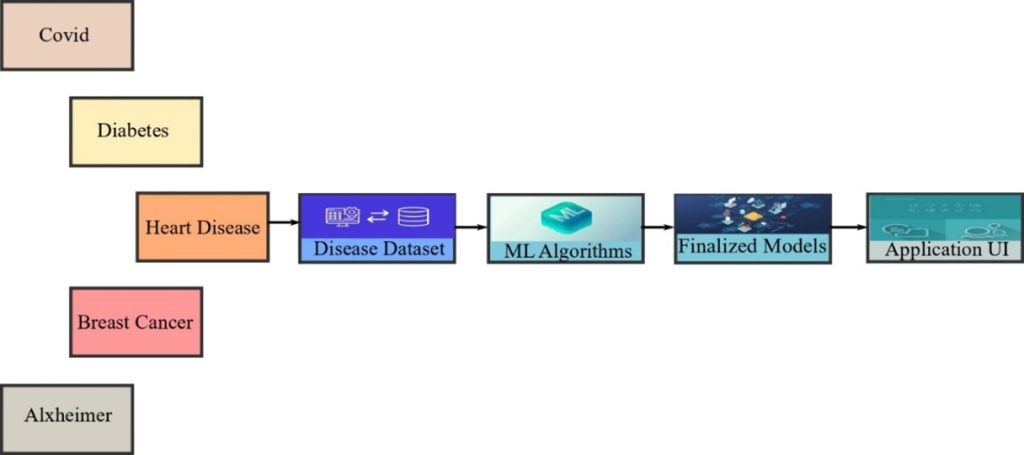
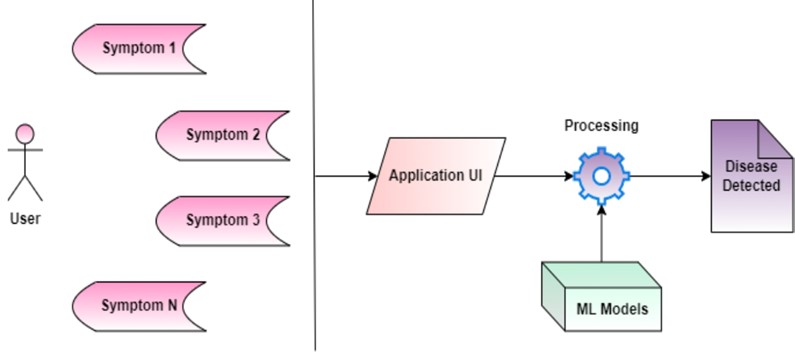
- Published in Departmental News, ECE NEWS, News, Research News
SRM AP Researchers Publish Groundbreaking Paper on DC Microgrid Integration
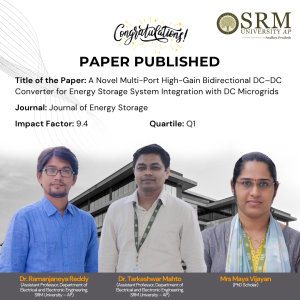 In a significant stride towards sustainable energy solutions, a team of researchers from the Department of Electrical and Electronic Engineering has unveiled a groundbreaking innovation. Their paper titled “A Novel Multi-Port High-Gain Bidirectional DC–DC Converter for Energy Storage System Integration with DC Microgrids” has been accepted in the prestigious Q1 Journal of Energy Storage, boasting an impressive impact factor of 9.4. The study focuses on addressing the critical challenges associated with energy storage systems (ESS) in direct current (DC) microgrids. Dr Ramanjaneya Reddy, Assistant Professor, Dr Tarkeshwar Mahto, Assistant Professor, and Mrs Maya Vijayan, a dedicated PhD Scholar, collaborated to design a multi-port high-gain bidirectional DC-DC converter. This innovative converter facilitates seamless integration of energy storage systems with DC microgrids, enhancing overall system efficiency and reliability.
In a significant stride towards sustainable energy solutions, a team of researchers from the Department of Electrical and Electronic Engineering has unveiled a groundbreaking innovation. Their paper titled “A Novel Multi-Port High-Gain Bidirectional DC–DC Converter for Energy Storage System Integration with DC Microgrids” has been accepted in the prestigious Q1 Journal of Energy Storage, boasting an impressive impact factor of 9.4. The study focuses on addressing the critical challenges associated with energy storage systems (ESS) in direct current (DC) microgrids. Dr Ramanjaneya Reddy, Assistant Professor, Dr Tarkeshwar Mahto, Assistant Professor, and Mrs Maya Vijayan, a dedicated PhD Scholar, collaborated to design a multi-port high-gain bidirectional DC-DC converter. This innovative converter facilitates seamless integration of energy storage systems with DC microgrids, enhancing overall system efficiency and reliability.
Abstract
Bidirectional converters have often been used in numerous applications like DC microgrids, renewable energy, hybrid energy storage systems, electric vehicles, etc. The paper proposes a novel multi-port high-gain (NMPHG) bidirectional DC-DC converter that supports DC microgrid (DC-MG) applications. The main contributions of the proposed converter are high step-up/step-down conversion gain, multiple input ports, lower switch voltage stress, and lower component count owing to the single converter with multiple input ports for DC microgrid applications.
The detailed operational principle, analysis, and design considerations of proposed NMPHG bidirectional DC-DC converters are discussed. Furthermore, the loss analysis, detailed comparison with similar works, and efficiency analysis with non-modalities during forward power flow (LV to HV) and reverse power flow (HV to LV) modes are presented. The efficiency of the proposed converter is found to be 93.8% in forward power flow and 92.9% in reverse power flow modes at rated power. Finally, a hardware prototype of the proposed NMPHG bidirectional DC-DC converter is implemented with 100 W in FPF mode and 200 W in RPF mode with a TMS320F28335 processor and validated with theoretical counterparts.
Explanation of Research in Layperson’s Terms
The proposed converter is a 200W bidirectional topology used in DC microgrid applications such as renewable energy, hybrid energy storage systems, and electric vehicles. The converter can accept two or more sources to supply the load. Thus, it is suitable for various applications of traction vehicles. It exhibits a lower switch stress and reduces the component ratings to lower values.
Title of Research Paper in the Citation Format
A NOVEL MULTI-PORT HIGH-GAIN BIDIRECTIONAL DC-DC CONVERTER FOR ENERGY STORAGE SYSTEM INTEGRATION WITH DC MICROGRIDS
Vijayan, Maya, Ramanjaneya Reddy Udumula, Tarkeshwar Mahto, and Ravi Eswar KM. “A novel multi-port high-gain bidirectional DC-DC converter for energy storage system integration with DC microgrids.” Journal of Energy Storage 87 (2024): 111431.
Practical Implementation or the Social Implications Associated with it
The features include port expandability on the source side, lower switch voltage stress, bidirectional property, and fewer components. It is most suitable for electric vehicles, Unmanned ariel vehicles, and energy storage systems at renewable power plants, etc. It improves the reliability of the grid system whereas hybrid energy storage systems with battery or supercapacitor will improve system stability.
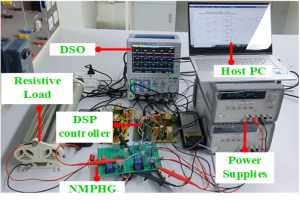
It can be used in various on-grid and off-grid applications like hospitals, offices, and educational institutions, especially where energy backup is very important. These types of converters are more specific for use in fast power transition required such as EVs, drones, aircraft, space vehicles, etc. The major advantage is the reduction in the size of the converter due to multiple source capability and ease of control.
Future Research Plans
We plan to work on a bidirectional converter with better efficiency and ultra-high gain. That should be able to reduce the size of the converter and the source ratings too. Design and implement bidirectional multi-port converters for various applications of DC microgrids, such as renewable and hybrid storage integration.
- Published in Departmental News, EEE NEWS, News, Research News
A Study on Self-Learning Controller Design for DC-DC Power Converters
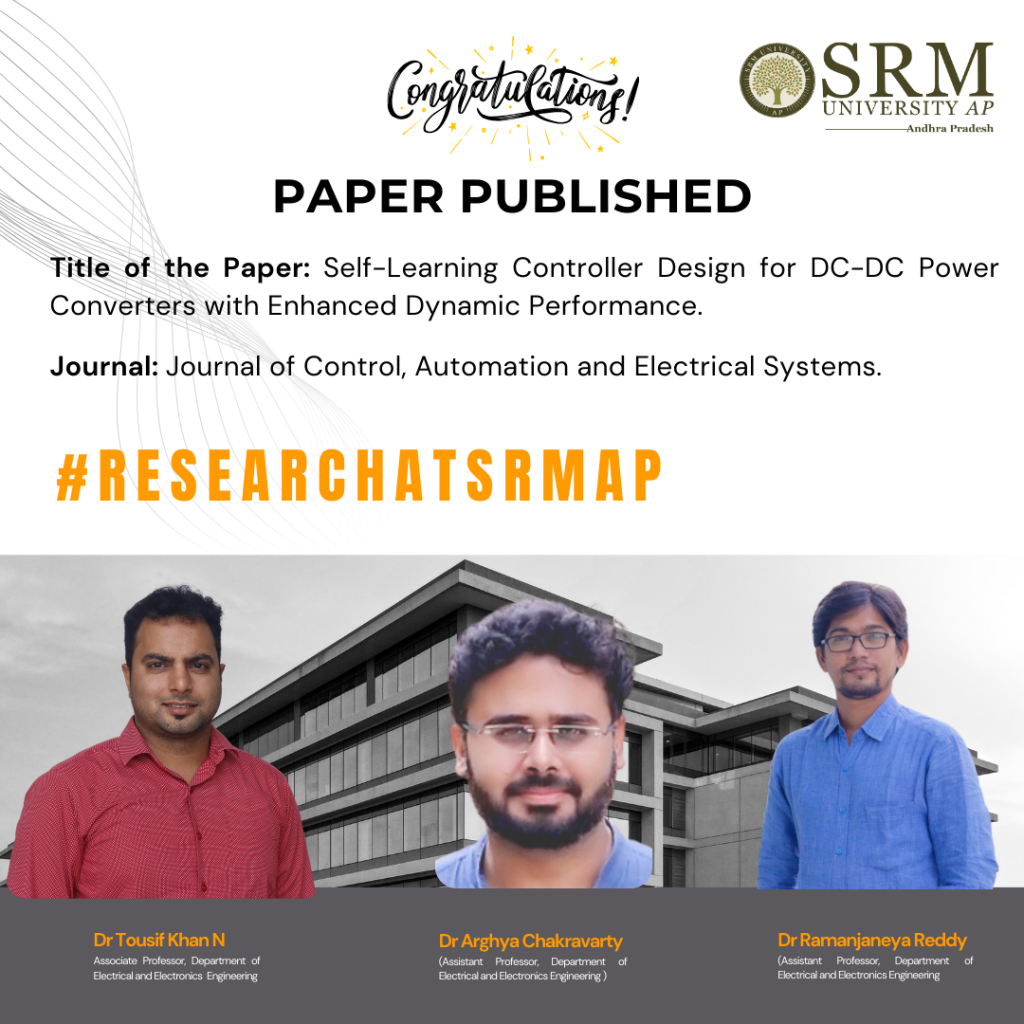
It is with great pleasure that we announce the publication of a research paper titled “Self-Learning Controller Design for DC-DC Power Converters with Enhanced Dynamic Performance,” jointly authored by Dr Tousif Khan N, Associate Professor, Department of Electrical and Electronics Engineering, and Dr Ramanjaneya Reddy & Dr Arghya Chakravarty, Assistant Professors, Department of Electrical and Electronics Engineering. The research paper introduces a novel self-learning control for precise output voltage tracking in DC-DC buck power converters.
Abstract:
This article introduces a self-learning robust control approach for accurate output voltage tracking in DC-DC buck power converters, focusing on scenarios with high precision requirements and significant load uncertainties. The method employs a simple online neural network to swiftly estimate unexpected load changes and disturbances across a wide range. Operating within a backstepping framework, the controller utilises neural network-learned uncertainties to enhance stability and improve dynamic and steady-state performance of both output voltage and inductor current. Extensive numerical simulations and practical experiments on a laboratory prototype demonstrate substantial enhancements in dynamic performance with a 94% reduction in settling time and precise steady-state tracking. The reliability of the proposed controller is further supported by the consistency between computational and experimental outcomes, showcasing its potential for real-world applications.
Practical implementations:
The proposed controller can be implemented/used for robotics applications, industrial processes, and medical equipment where precise control is needed.
Future research plans:
The following are the potential future directions of the proposed work;
(i) Design and development of the proposed self-learning neural network-based control for DC-DC buck converter systems with real-time DC sources, such as solar PV and fuel cells, experiencing highly intermittent input voltage changes.
(ii) Incorporating inductor current constraints and output voltage limitations into the proposed controller would also be an avenue worth exploring.
We congratulate the professors for their valuable contribution and look forward to future breakthroughs in this area.
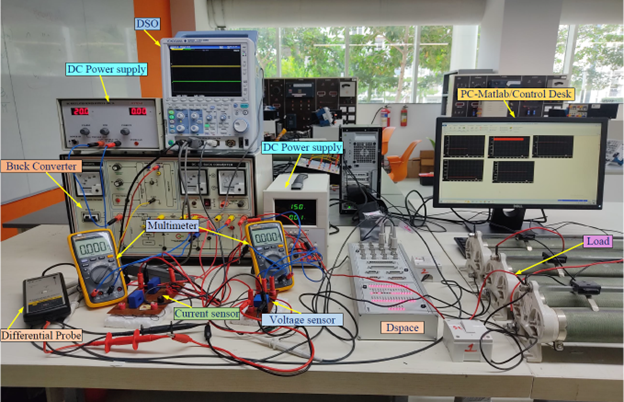
- Published in Departmental News, EEE NEWS, News, Research News
Unveiling Findings on Thermo-Mechanical Behaviour of FGM Sandwich Plates
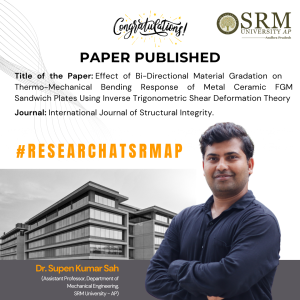 In a significant advancement in the field of material engineering, Dr Supen Kumar Sah, an esteemed Assistant Professor from the Department of Mechanical Engineering, has published a groundbreaking research paper.
In a significant advancement in the field of material engineering, Dr Supen Kumar Sah, an esteemed Assistant Professor from the Department of Mechanical Engineering, has published a groundbreaking research paper.
The study, titled “Effect of Bi-Directional Material Gradation on Thermo-Mechanical Bending Response of Metal Ceramic FGM Sandwich Plates Using Inverse Trigonometric Shear Deformation Theory,” appears in the prestigious International Journal of Structural Integrity.
Dr Sah’s research provides new insights into the behaviour of Functionally Graded Materials (FGMs) under thermal and mechanical loads, which is crucial for the design of advanced engineering structures. His work employs an innovative inverse trigonometric shear deformation theory to analyse the bending response of metal-ceramic FGM sandwich plates, offering a more accurate prediction of their performance in real-world applications.
This publication not only highlights the cutting-edge research being conducted at SRM University but also positions Dr Sah as a leading figure in the application of FGMs in structural engineering. The findings from this paper have the potential to influence the design and optimization of materials used in various industries, from aerospace to automotive.
Abstract
The purpose of this study is to investigate the bending analysis of metal (Ti-6Al-4V) ceramic (ZrO_2) functionally graded material (FGM) sandwich plate having material property gradation along length and thickness direction under thermo-mechanical loading using inverse trigonometric shear deformation theory (ITSDT). Mechanical and thermal properties of BDFGM sandwich plates are considered temperature-dependent in the present study. Analytical solution for bending analysis of FGM plate has been carried out using Hamilton’s principle and Navier’s solution.


The present study shows that centre deflection, normal stress, and shear stress are significantly influenced by temperature-dependent material properties, bi-directional gradation exponents’ geometrical parameters, sandwich plate layer thickness, etc.
Title of the Research Paper in the Citation Format
Sah, S. K., Ghosh, A. (2024). Effect of Bi-Directional Material Gradation on Thermo-Mechanical Bending Response of Metal Ceramic FGM Sandwich Plates Using Inverse Trigonometric Shear Deformation Theory. International Journal Structural Integrity. DOI: 10.1108/IJSI-02-2024-0016
Collaborations
Prof Anup Ghosh, Indian Institute of Technology Kharagpur, India
Future Research Plans
Modelling and Analysis of porous uni and multi-directional Functionally Graded Material (FGM) plates to obtain the impact of porosity distributions over structural responses.
Analytical & Finite Element Solution for static and dynamic response of FGM sandwich plates employing non-polynomial shear deformation theories under elastic foundation.
- Published in Departmental News, Mechanical Engineering NEWS, News, Research News
Advancing Knowledge: Publication of Groundbreaking Research Paper
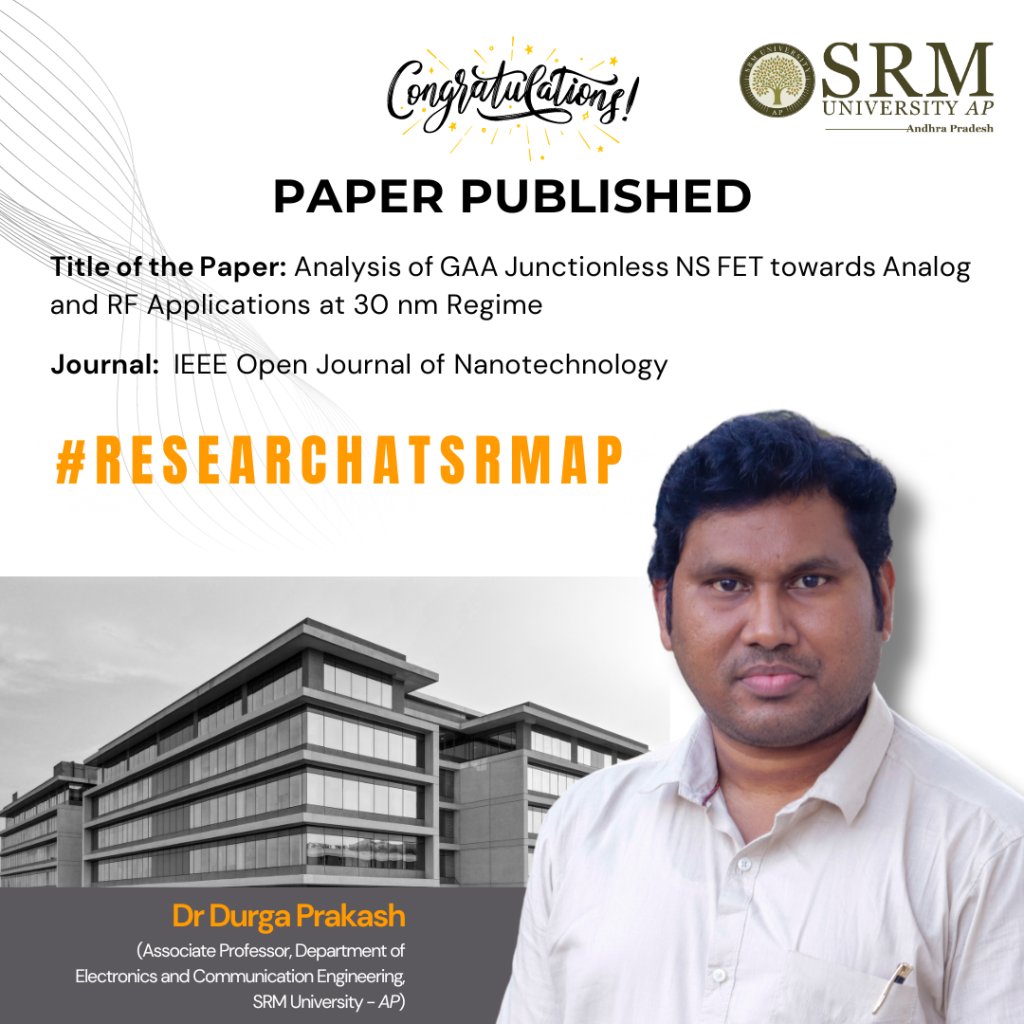
It is a matter of immense pleasure for the Department of Electronics and Communication Engineering to announce the publication of Dr Duga Prakash, Associate Professor at SRM University-AP. His research paper titled “Analysis of GAA Junctionless NS FET towards Analog and RF Applications at 30 nm Regime”, published in IEEE Open Journal of Nanotechnology, studies how the device can be manufactured with ease and minimal doping, eliminating the need for high-temperature doping processes. The enhanced performance metrics suggest that the device’s potential for faster analog/RF switching circuits paves the way for more efficient analog and RF applications at the 30 nm scale.
Abstract:
A new nanosheet FET is used to generate a quantum model in this research. A Gate-all-around (GAA) Junction-less (JL) nanosheet device with a 1 nm gate dielectric of SiO2 and HfO2 performs according to the standard model. The visual TCAD tool examines ION, IOFF, ION/ IOFF, threshold voltage, DIBL, gain parameters (gm, gd, Av), gate capacitance, and cut-off frequency to evaluate the classical and quantum models of the GAA nanosheet device. Simulation results show that the device’s low gate capacitance of 10–18 makes it suitable for rapid switching applications. Device research reveals a transconductance (gm) value of 21 μS and a remarkable cut-off frequency of 9.03 GHz. Its P-type device response has also been extensively studied. Finally, the inverter model uses the proposed GAA nanosheet device. Despite having larger gate capacitance, the NSFET-based inverter offers the smallest propagation delay helps apply knowledge to real-world situations.


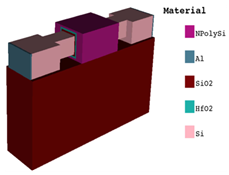
- Published in Departmental News, ECE NEWS, News, Research News
Exploring Contemporary Narratives in New Media
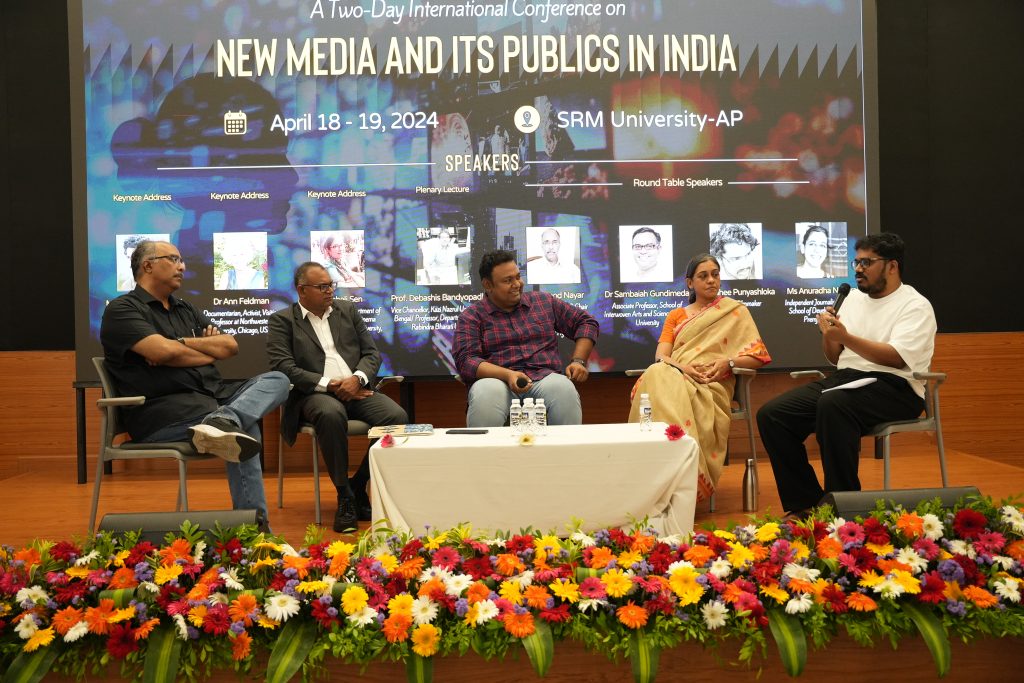
Department of Liberal Arts and the Department of Media Studies, under the aegis of the Easwari School of Liberal Arts at SRM University-AP organised its 2-day International Conference on New Media and its Publics in India. This prestigious conference welcomed renowned figures, including Mr Abhinandan Sekhri, co-founder and CEO of Newslaundry; Dr Ann Feldman, Documentarian and Activist; Dr Meheli Sen, Associate Professor, Department of AMESALL, Director of Cinema Studies Program, Rutgers University; Dr Pramod K Nayar, Professor and UNESCO Chair in Vulnerability Studies, Department of English, University of Hyderabad; Dr Sambaiah Gundimeda, Associate Professor, School of Interwoven Arts and Sciences, KREA University; Mr Rahee Punyashloka, Artist and Filmmaker and Ms Anuradha Nagaraj, Independent Journalist, Faculty at School of Development, Azim Premji University.
In his inaugural address, Vice Chancellor Prof. Manoj K Arora remarked, “We are honoured to host a conference of this magnitude. Media has become an indispensable facet of our contemporary existence; invariably, we all engage with or subscribe to media in some capacity.” Keynote speaker and co-founder of Newslaundry, Mr Abhinandan Sekhri, imparted his wisdom to the attendees, emphasising, “As the fourth pillar, media plays a pivotal role in society. It is imperative that we discern and uphold the principles of authentic journalism.” Prof. Vishnupad, Dean-Easwari School of Liberal Arts, remarked,” Technology and media have become an essential aspect of our lives today, and they have drastically altered our perception of things.”
Dr Meheli Sen, Dr Ann Feldman, Dr Pramod Nayar, Dr Sambaiah Gundimeda, Mr Rahee Punyashloka, and Ms Anuradha Nagarajan all deliberated on the various possibilities and interpretations that the New media offers and thereby shapes the public narratives. The conference also comprised a series of parallel sessions that explored the multifaceted relationship between New Media and various disciplines. Topics discussed included New Media and Literature, Gender, History, Democracy and Performance. Members of the academia presented their research papers, fostering insightful discussions on the evolving landscape of New Media.
The two-day event witnessed 150+ entries from students, scholars and faculties from across the country and the world and provided a platform for intellectual exchange but also fostered a collaborative spirit among participants. The conference concluded with a plenary address by Dr Pramod Nayar, which served as a catalyst for innovative thinking in New Media. Registrar Dr R Premkumar, in his message, applauded the efforts of the convenors, Dr Asijit Dutta and co-convenors Dr Sapna Mishra and Dr Partha Bhattacharjee for organising a scholarly colloquium such as this and remarked, “the exchange of ideas, scholarly debates, and interdisciplinary discussions that transpired here will undoubtedly enrich the academic landscape and advancement in the field of new media”.
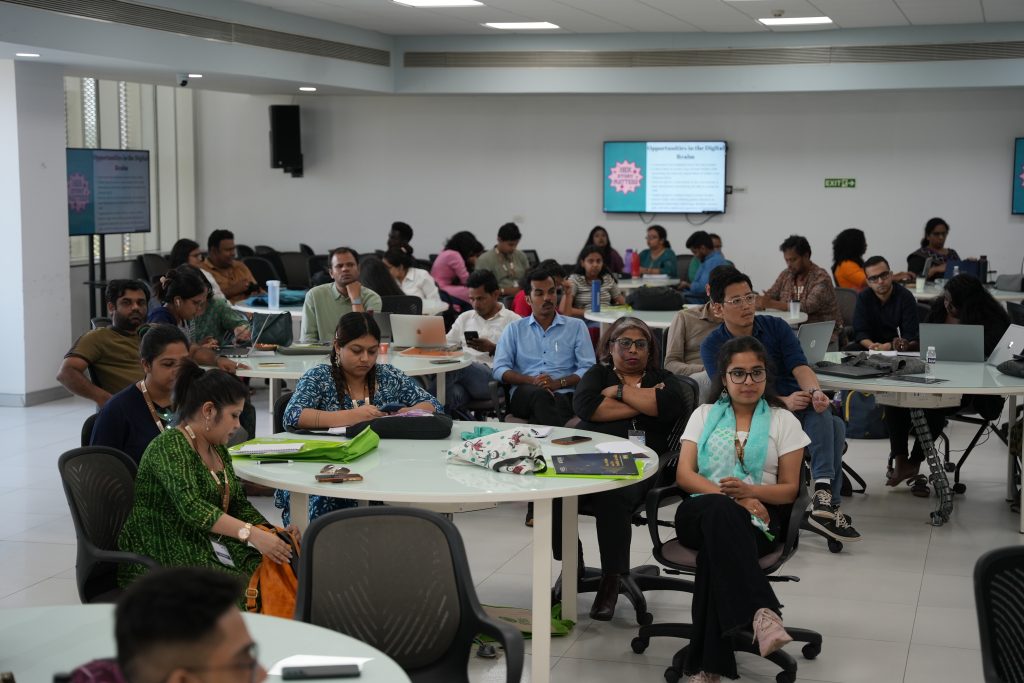
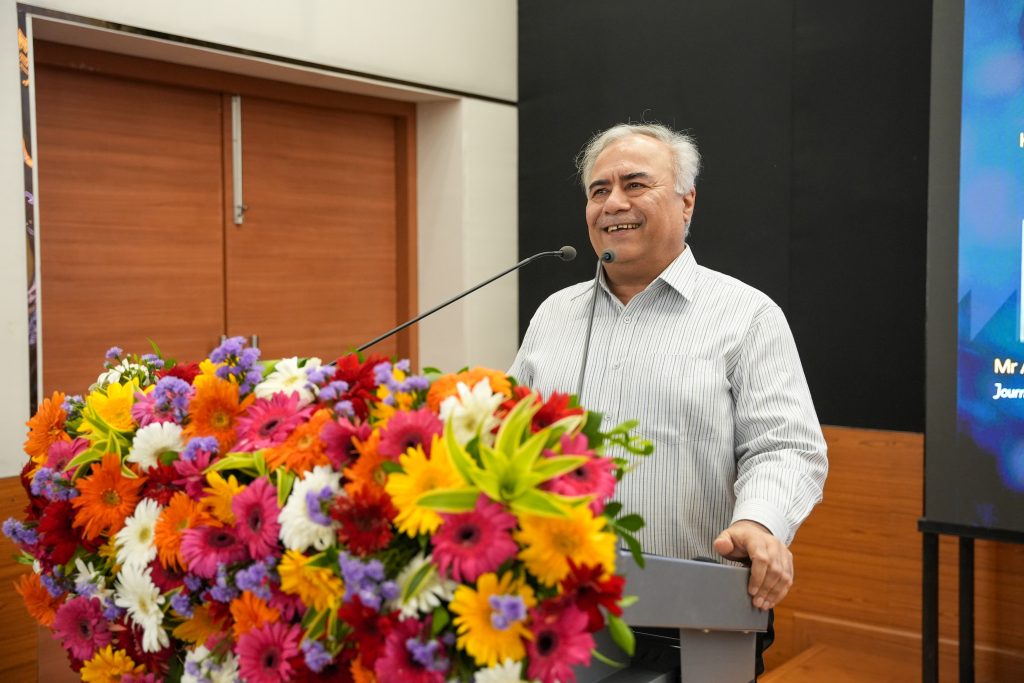
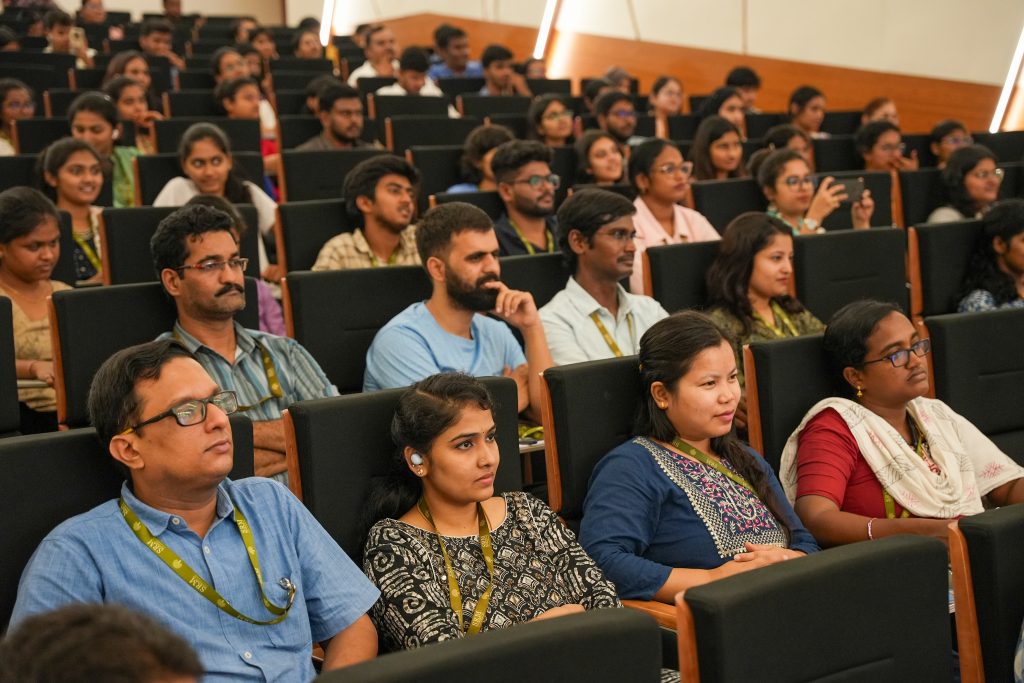
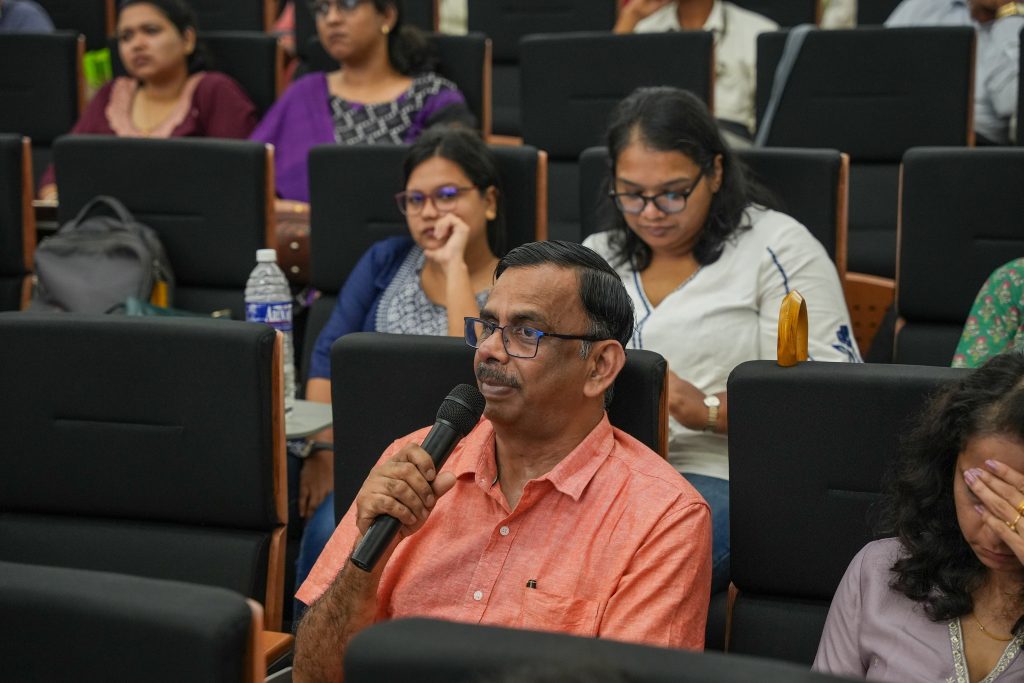
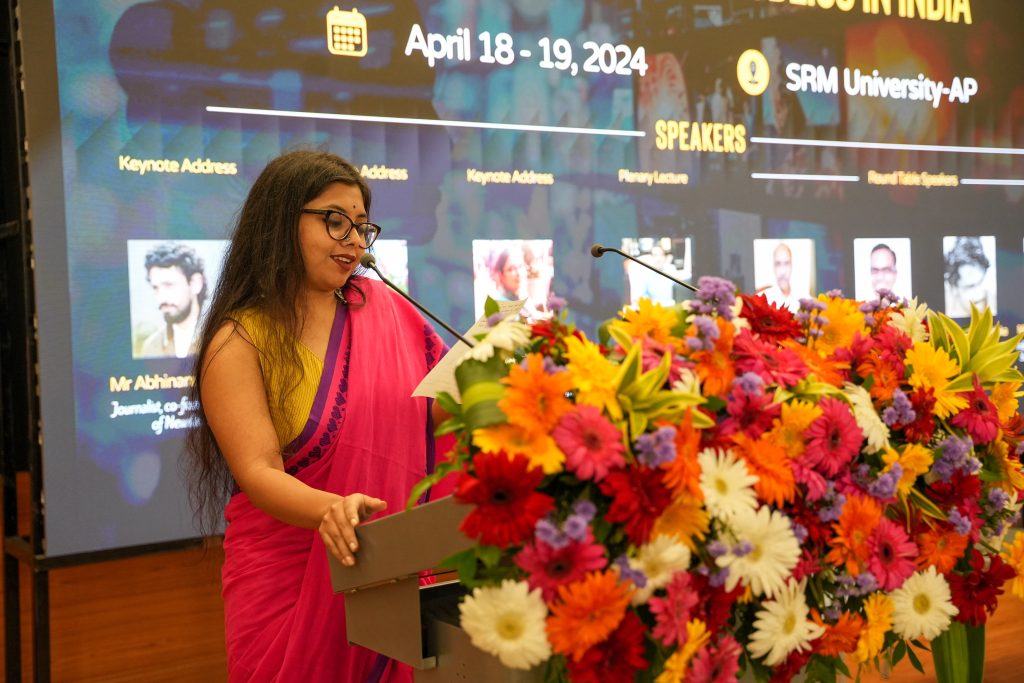
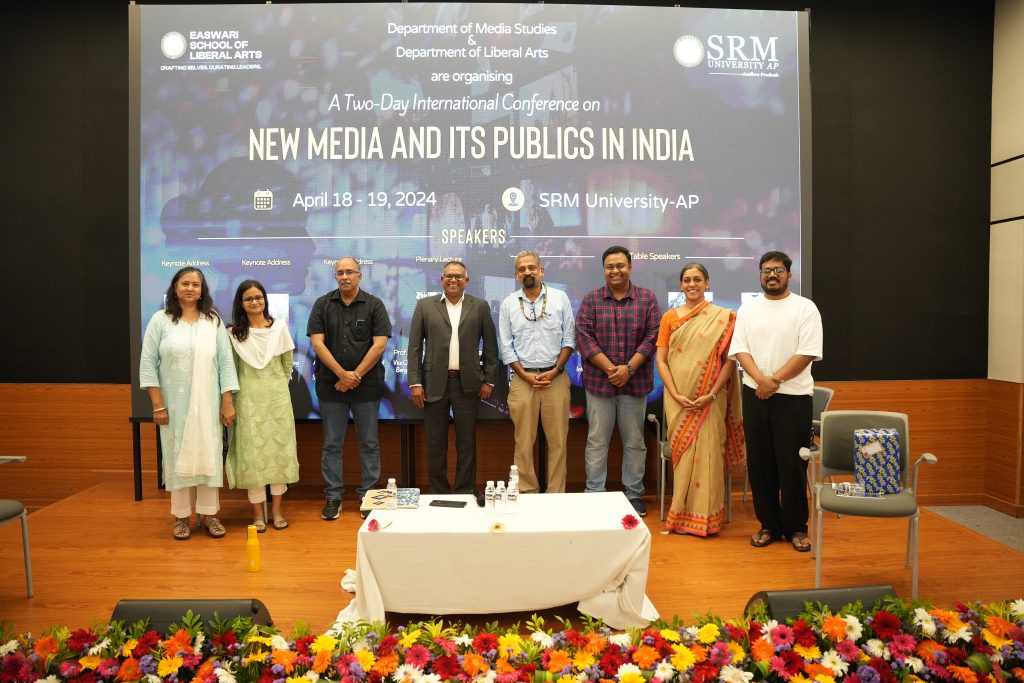
- Published in Departmental News, Liberal Arts News, Media Studies, News
Unveiling the Post-Pandemic Tapestry of Mind and Body in Türkiye
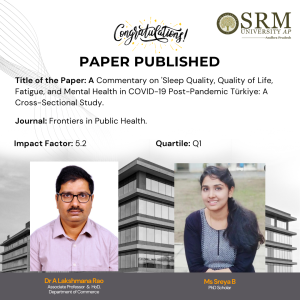 We are thrilled to announce that Dr A Lakshmana Rao, Associate Professor from the Department of Commerce along with Ms Sreya B, a distinguished PhD Scholar, have made a significant contribution to the field of public health with their latest publication.
We are thrilled to announce that Dr A Lakshmana Rao, Associate Professor from the Department of Commerce along with Ms Sreya B, a distinguished PhD Scholar, have made a significant contribution to the field of public health with their latest publication.
Their paper, titled “A Commentary on ‘Sleep Quality, Quality of Life, Fatigue, and Mental Health in COVID-19 post-pandemic Türkiye: A Cross-Sectional Study’,” has been published in the esteemed journal Frontiers in Public Health, which boasts an impressive impact factor of 5.2.
This groundbreaking study delves into the crucial aspects of sleep quality, quality of life, fatigue, and mental health in the aftermath of the COVID-19 pandemic in Türkiye. The research provides insightful commentary and analysis, contributing valuable knowledge to our understanding of the pandemic’s long-term effects on human well-being.
The SRM University-AP community is proud of Dr Rao and Ms Sreya B for their dedication and excellence in research. Their work not only enhances the reputation of our institution but also serves as an inspiration for our students and faculty alike.
We congratulate them on their achievement and encourage our readers to access the full paper to learn more about the study’s findings and implications for public health.
Abstract
This commentary examines the impact of the COVID-19 pandemic on mental health and sleep quality among the Turkish population, focusing on socio-demographic disparities and gender-based differences. To investigate the lasting effects of the pandemic, a comprehensive cross-sectional, multi-center-based survey was conducted in 2022. The study used robust sampling strategies and validated assessment tools such as WHOQOL-BREF, PHQ-15, DASS-21, GAD-7, PSQI, and FAS to reveal significant associations between poor sleep quality and worsened mental health.
The findings highlight the need for targeted interventions post-pandemic. The study conducted a detailed analysis, including multivariate regression, to explore the interaction between socio-demographic factors, mental health, and sleep quality, providing valuable insights for future public health interventions that consider both socio-demographic characteristics and lifestyle factors. In conclusion, the study advocates prioritising interventions that enhance sleep quality as a crucial aspect of post-pandemic public health, offering potential avenues for mitigating mental health disorders. Despite acknowledged limitations, the research’s contributions to understanding post-pandemic mental health challenges underscore its relevance in shaping targeted public health interventions.
Explanation of the Research in Layperson’s Terms
This article discusses a research study conducted in Turkey to investigate the impact of the COVID-19 pandemic on people’s sleep, quality of life, fatigue, and mental health. The study discovered that numerous individuals experienced sleep problems and mental health disorders following the pandemic, likely due to stress and social isolation. It suggests that enhancing sleep quality could help to improve mental health in the future, emphasising the significance of addressing these issues in public health strategies.
Title of Research Paper in the Citation Format
Sreya B, Lakshmana Rao A, (2024) Commentary: Sleep quality, quality of life, fatigue, and mental health in COVID-19 post-pandemic Türkiye: a cross-sectional study. Front. Public Health 12:1393054. Doi: 10.3389/fpubh.2024.1393054
Practical Implementation or the Social Implications Associated with the Research
The findings of the research have significant practical and social implications for addressing the impact of the COVID-19 pandemic on the Turkish population. The study underscores the importance of targeted interventions aimed at improving sleep quality to mitigate long-term mental health challenges. These interventions might involve stress management programs, education on sleep hygiene, and increased access to mental health services. Furthermore, optimising healthcare resource allocation by prioritising mental health services and sleep disorder clinics could enhance support for individuals struggling with mental health issues.
Public health campaigns focusing on the importance of sleep for mental well-being could raise awareness and promote strategies for improving sleep quality across various demographic groups. Additionally, the research helps reduce stigma around mental health by highlighting the prevalence of mental health symptoms and sleep disturbances post-pandemic, encouraging more individuals to seek support without fear of judgment. Moreover, recognising the impact of social isolation on mental health and sleep quality underscores the importance of fostering social support networks and community connections to aid in post-pandemic recovery.
Policy development informed by the research findings could address broader social determinants of health, such as housing insecurity and access to healthcare, to create a more supportive environment for mental health and sleep quality improvement initiatives. Overall, integrating mental health and sleep quality considerations into post-pandemic recovery efforts is crucial for promoting the overall well-being of the Turkish population.
- Published in Commerce Current Happenings, Departmental News, News, Research News
Triumphant Trio: Dr Soumyajyoti and Scholars Make Strides in Physics
 In a significant academic achievement, Dr Soumyajyoti Biswas, Assistant Professor and Scholars Ms Diksha and Mr Gunnemeda Eswar in the Department of Physics, has published an insightful paper in the prestigious Q1 journal, Physical Review E. The paper, titled “Prediction of depinning transitions in interface models using Gini and Kolkata indices,” presents a novel approach to understanding the complex phenomena of depinning transitions in physical systems.
In a significant academic achievement, Dr Soumyajyoti Biswas, Assistant Professor and Scholars Ms Diksha and Mr Gunnemeda Eswar in the Department of Physics, has published an insightful paper in the prestigious Q1 journal, Physical Review E. The paper, titled “Prediction of depinning transitions in interface models using Gini and Kolkata indices,” presents a novel approach to understanding the complex phenomena of depinning transitions in physical systems.
The research introduces the use of Gini and Kolkata indices as predictive tools, offering a fresh perspective that could pave the way for new discoveries in the field. This publication not only underscores Dr. Biswas’s expertise but also enhances the university’s reputation as a hub for cutting-edge research.
The Department of Physics congratulates Dr. Biswas on this remarkable accomplishment and looks forward to the continued impact of his work on the scientific community.
Abstract
The intermittent dynamics of driven interfaces through disordered media and its subsequent depinning for large enough driving force is a common feature for a myriad of diverse systems, starting from mode-I fracture, vortex lines in superconductors, and magnetic domain walls to invading fluid in a porous medium, to name a few. In this work, we outline a framework that can give a precursory signal of the imminent depinning transition by monitoring the variations in sizes or the inequality of the intermittent responses of a system that are seen prior to the depinning point. In particular, we use measures traditionally used to quantify economic inequality, i.e., the Gini index and the Kolkata index, for the case of the unequal responses of precritical systems.
The crossing point of these two indices serves as a precursor to imminent depinning. Given a scale-free size distribution of the responses, we calculate the expressions for these indices, evaluate their crossing points, and give a recipe for forecasting depinning transitions.We apply this method to the Edwards-Wilkinson, Kardar-Parisi-Zhang, and fiber bundle model interface with variable interaction strengths and quenched disorder. The results are applicable for any interface dynamics undergoing a depinning transition.
Explanation of Research in Layperson’s Terms
Many different physical systems, from cracking in materials to the movement of magnetic fields, share a common underlying behavior – they all involve an “interface” or boundary that moves through a disordered, or irregular, medium. As this interface moves, it often gets “pinned” or stuck in place by the disorder in the medium. However, as the driving force on the interface increases, there comes a point where the interface suddenly “depins” and starts moving much more freely. This transition from a pinned to a depinned state is called the “depinning transition” and it’s an important phenomenon in many areas of science and engineering.
In this work we have found a way to detect when this depinning transition is about to happen, before it actually occurs. We do this by looking at the sizes or magnitudes of the intermittent, or irregular, responses of the system as the driving force increases. Specifically, we use two measures that are traditionally used to quantify economic inequality – the Gini index and the Kolkata index. These give a way to track how “unequal” or unevenly distributed the sizes of the responses are. We found that when these two inequality measures cross each other, it serves as a precursor or early warning sign that the depinning transition is imminent. This is a powerful result because being able to predict when depinning will happen is very useful in fields like material science, superconductivity, and fluid dynamics, where controlling these phase transitions is important. By monitoring these inequality measures, one can may be able to forecast depinning events before they occur, which could lead to better design and control of these systems.
Title of Research paper in the Citation Format
Diksha, G. Eswar, and S. Biswas, Prediction of depinning transitions in interface models using Gini and Kolkata indices, Physical Review E 109, 044113 (2024).
DOI: https://doi.org/10.1103/PhysRevE.109.044113
Practical Implementation or the Social Implications Associated with it
Prediction of imminent transition has implications in a wide range of disciplines, including stability of mechanical structures (buildings, aircraft, bridges, etc.), extraction of oil (fracking) to the largest scale of mechanical failure i.e., earthquakes.
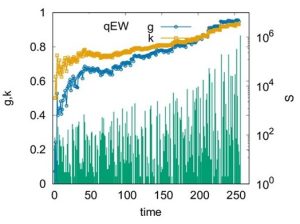
In this fig. the time series of avalanche sizes is shown along with the time variations of g and k for the quenched Edwards-Wilkinson model as a prototype. Here the crossing of g and k occurs prior to the depinning transition point (the last avalanche in the series). Therefore, the crossing of g and k can serve as a good indicator of an imminent depinning transition.
Collaborations
This work is done with the PhD student Ms Diksha and the BSc student Mr Gunnemeda Eswar.
Future Research Plans
Future research plans include applications of the methods developed here to be applied to real-life physical structures for their stability analysis and predictions of impending catastrophes.
- Published in Departmental News, News, Physics News, Research News
Groundbreaking Mathematical Model Sheds Light on Bone Remodeling
 In a significant academic achievement, the Department of Mathematics is proud to announce that Dr Koyel Chakravarty, an Assistant Professor, along with her diligent PhD Scholar, Ms Amrutha Sreekumar, has made a remarkable contribution to the field of biological mathematics. Their paper, titled “Exploring the Impact of PTH Therapy on Bone Remodeling: A Mathematical Investigation,” has been officially accepted for publication in the prestigious Journal of Biological Systems by World Scientific.
In a significant academic achievement, the Department of Mathematics is proud to announce that Dr Koyel Chakravarty, an Assistant Professor, along with her diligent PhD Scholar, Ms Amrutha Sreekumar, has made a remarkable contribution to the field of biological mathematics. Their paper, titled “Exploring the Impact of PTH Therapy on Bone Remodeling: A Mathematical Investigation,” has been officially accepted for publication in the prestigious Journal of Biological Systems by World Scientific.
This paper presents a comprehensive mathematical model that investigates the effects of Parathyroid Hormone (PTH) therapy on bone remodelling processes. The research provides valuable insights that could potentially lead to more effective treatments for bone-related diseases and conditions.
The university community extends its heartfelt congratulations to Dr Chakravarty and Ms Sreekumar for their dedication and hard work.
Abstract
The regulatory role of parathyroid hormone (PTH) on bone, a crucial calcium reservoir, is influenced by sex steroids, notably estrogen. A mathematical model elucidates PTH-mediated bone remodeling mechanisms, examining plasma PTH effects and external dosages. Daily PTH injections, with their dual anabolic or catabolic action, offer a notable treatment for severe osteoporosis. This study predicts osteogenic responses to PTH, integrating factors like TGF-β, RANKL, and bisphosphonates in osteoblast-osteoclast signaling, alongside PTH’s effects on glands and regulatory molecules like Runx2, pCREB, and Bcl2. Using various methods, including simulations and sensitivity analysis, it aims to understand PTH therapy’s impact on bone volume, enhancing its clinical relevance.
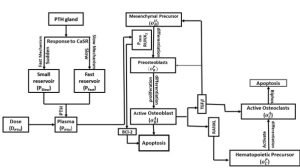
Explanation of the Research in Layperson’s Terms
The role of parathyroid hormone (PTH) in calcium storage within bones is significant, with its regulation influenced by other hormones, notably estrogen. A mathematical model has been developed to comprehend the effects of PTH on bones, examining both endogenous levels in the blood and exogenous intake requirements. It has been observed that daily PTH injections can be beneficial in treating severe bone conditions like osteoporosis, as these injections can induce either bone formation or resorption, depending on their administration method. Additionally, the response of bones to PTH is under scrutiny in this study, considering various substances such as TGF-β, RANKL, and bisphosphonates, and their interplay in maintaining bone health. Through the utilization of different methodologies including computer simulations, efforts are being made to precisely understand how PTH injections influence bone health, thereby enhancing their efficacy in addressing bone-related ailments.
Title of the Research paper in the Citation Format
Exploring the Impact of PTH Therapy on Bone Remodeling: A Mathematical Investigation
Practical Implementation or the Social Implications Associated
Personalized Treatment Plans:
Mathematical modeling of bone remodeling can facilitate the development of personalized treatment plans for individuals with bone disorders such as osteoporosis. By considering factors like hormone levels, genetic predispositions, and lifestyle factors, healthcare providers can tailor treatment strategies to optimize bone health outcomes.
1. Drug Development:
Insights gained from mathematical models can aid in the development of new drugs for bone disorders. By simulating the effects of potential therapeutic agents on bone remodeling processes, researchers can identify promising candidates for further investigation, potentially accelerating the drug discovery process.
2. Improved Clinical Decision Making:
Healthcare professionals can use mathematical models to make more informed clinical decisions regarding the management of bone disorders. By integrating patient-specific data into predictive models, clinicians can better predict treatment outcomes and adjust therapeutic interventions accordingly.
3. Enhanced Surgical Planning:
Mathematical modeling can also be valuable in surgical planning for procedures such as bone grafting or joint replacement. By simulating the effects of surgical interventions on bone remodeling, surgeons can optimize surgical techniques to promote more effective healing and long-term outcomes for patients.
4. Public Health Interventions:
Understanding the factors influencing bone remodeling at a population level can inform public health interventions aimed at reducing the burden of bone disorders. By identifying modifiable risk factors and developing targeted prevention strategies, policymakers can promote bone health and reduce the incidence of conditions like osteoporosis on a larger scale.
5. Educational Tools:
Mathematical models of bone remodeling can serve as educational tools for healthcare professionals, students, and patients. By visualizing complex biological processes in a simplified manner, these models can enhance understanding of bone physiology and the mechanisms underlying bone disorders, ultimately improving patient care and outcomes.
Collaborators:
• Prof. D.C. Dalal, Professor, Department of Mathematics, IIT Guwahati
• Dr. L.N. Guin, Associate Professor, Department of Mathematics, Visva-Bharati
Future research plans.
a) Incorporating Multi-Scale Modeling: Future research could focus on integrating multi-scale modeling approaches to capture the intricate interactions occurring at different levels of bone structure, from the molecular to the tissue level. By incorporating information on cellular processes, tissue mechanics, and systemic factors, these models could provide a more comprehensive understanding of bone remodeling dynamics.
b) Accounting for Heterogeneity: There is a need to develop mathematical models that account for the heterogeneity observed in bone remodeling processes across individuals and within different anatomical sites. By considering factors such as age, sex, genetics, and bone quality, researchers can create more personalized and accurate models to predict individual responses to treatment and disease progression.
c) Integration of Advanced Imaging Techniques: Advances in imaging technologies such as micro-computed tomography (micro-CT) and magnetic resonance imaging (MRI) provide detailed insights into bone structure and function. Future research could focus on integrating data from these advanced imaging techniques into mathematical models to enhance their predictive capabilities and enable non-invasive monitoring of bone remodeling in clinical settings.
d) Exploring Therapeutic Interventions: Researchers could use mathematical modeling to explore the efficacy of novel therapeutic interventions for bone disorders, such as drug treatments, exercise regimens, and dietary interventions. By simulating the effects of these interventions on bone remodeling processes, researchers can identify optimal treatment strategies and accelerate the development of new therapies.
Link to the article
- Published in Departmental News, Events, Math News, Research News
Research Paper on Computing In-memory Reconfigurable Adder Design
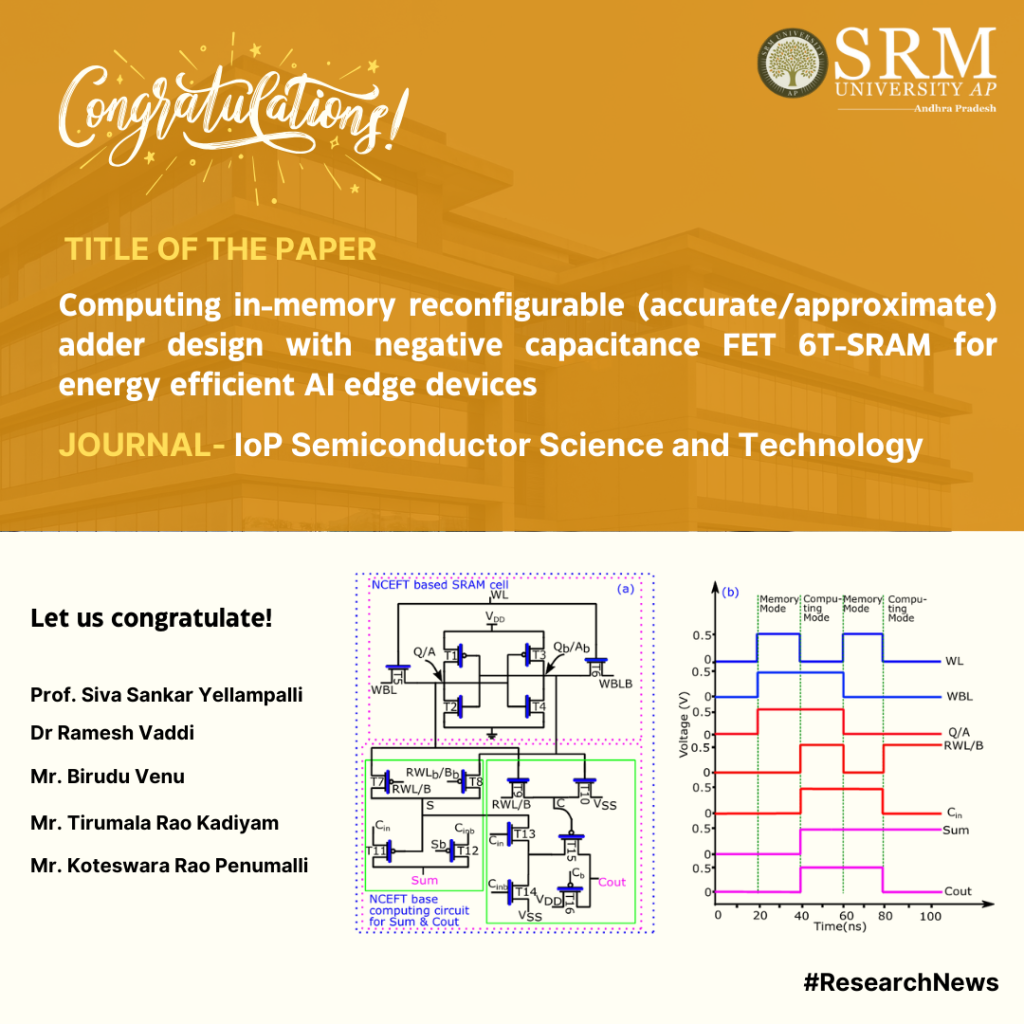
Prof. Siva Sankar Yelampalli and Dr Ramesh Vaddi, Associate Professor, from the Department of Electronics and Communication Engineering, along with research scholars Mr Birudu Venu, Mr Tirumala Rao Kadiyam, and Mr Koteswara Rao Penumalli, have jointly published a paper titled “Computing in-memory reconfigurable (accurate/approximate) adder design with negative capacitance FET 6T-SRAM for energy efficient AI edge devices” The paper introduces Computing in-memory (CiM) as a promising alternative to traditional von-Neumann architectures, focusing on its potential for energy-efficient AI edge computing with CMOS scaling. Additionally, they have explored the advancements in approximate computing in-memory (ACiM) techniques, aiming to further enhance the energy efficiency of these innovative architectures.
Abstract:
Computing in-memory (CiM) is an alternative to von Neumann architectures for energy-efficient AI edge computing architectures with CMOS scaling. Approximate computing in-memory (ACiM) techniques have also been recently proposed to further increase the energy efficiency of such architectures. In the first part of the work, a negative capacitance FET (NCFET) based 6T-SRAM CiM accurate full adder has been proposed, designed and performance benchmarked with equivalent baseline 40 nm CMOS design. Due to the steep slope characteristics of NCFET, at an increased ferroelectric layer thickness, Tfe of 3 nm, the energy consumption of the proposed accurate NCFET-based CiM design is ∼82.48% lower in comparison to the conventional/Non CiM full adder design and ∼85.27% lower energy consumption in comparison to the equivalent baseline CMOS CiM accurate full adder design at VDD = 0.5 V. This work further proposes a reconfigurable computing in-memory NCFET 6T-SRAM full adder design (the design which can operate both in accurate and approximate modes of operation). NCFET 6T-SRAM reconfigurable full adder design in accurate mode has ∼4.19x lower energy consumption and ∼4.47x lower energy consumption in approximation mode when compared to the baseline 40 nm CMOS design at VDD = 0.5 V, making NCFET-based approximate CiM adder designs preferable for energy efficient AI edge CiM based computing architectures for DNN processing.
Future research plans: Implementing reconfigurable computing in-memory (CiM) MAC for energy-efficient AI edge devices.

- Published in Departmental News, News, Research News

